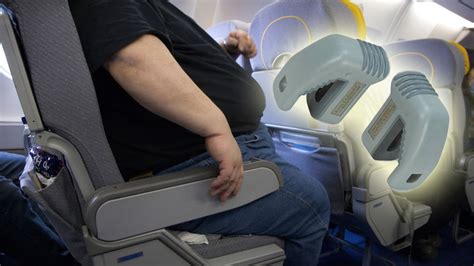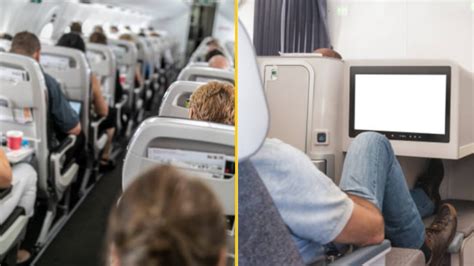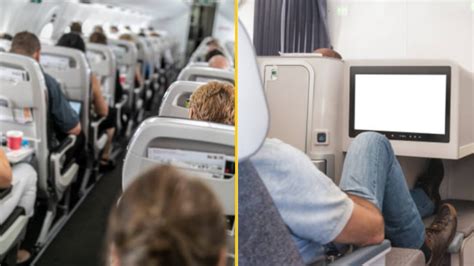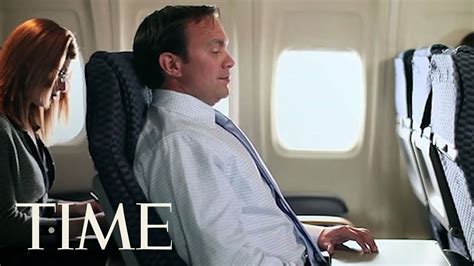
The Federal Aviation Administration (FAA) is now explicitly cracking down on unruly passenger behavior, including actions such as kicking or hitting airplane seats, with potential fines levied against offenders. This move comes as part of a broader effort to address a surge in disruptive incidents on flights, aiming to ensure safer and more comfortable travel experiences for all passengers.
The FAA’s renewed focus specifically targets physical altercations, including those stemming from seemingly minor annoyances such as repeated seat kicking. While the FAA already possesses the authority to fine passengers for various forms of disruptive behavior, this announcement clarifies and reinforces that actions like kicking, punching, pushing, or otherwise physically assaulting seats or other passengers are strictly prohibited and subject to penalties. These penalties can include hefty fines and, in more severe cases, referral to law enforcement for criminal prosecution.
According to the FAA, the increase in unruly passenger incidents began in early 2021 and has remained elevated compared to pre-pandemic levels. Many of these incidents have involved passengers refusing to comply with mask mandates (though these mandates have since been lifted), alcohol consumption, and general disruptions. The FAA’s “zero tolerance” policy, initiated in January 2021, has led to a significant increase in investigations and enforcement actions against unruly passengers. This includes proposing substantial civil penalties for a wide range of offenses, from verbal abuse to physical assault.
The agency’s decision to specifically highlight actions like seat kicking underscores its commitment to addressing a wide spectrum of disruptive behaviors that can compromise flight safety and passenger well-being. By explicitly stating that such actions are subject to fines, the FAA hopes to deter potential offenders and create a more respectful and comfortable environment for everyone on board. The FAA aims to create a safer environment for passengers and crew members by addressing unwanted physical altercations.
The FAA encourages passengers to report any incidents of unruly behavior to flight attendants immediately. This allows the crew to address the situation promptly and document the incident for potential investigation by the FAA. The agency also works closely with airlines and law enforcement agencies to ensure that unruly passengers are held accountable for their actions.
The FAA has also launched public awareness campaigns to educate passengers about the consequences of unruly behavior and to promote respectful and responsible conduct on flights. These campaigns emphasize that disruptive behavior can have serious repercussions, including substantial fines, criminal charges, and even being banned from flying in the future.
This initiative comes amidst broader discussions about passenger rights and responsibilities in air travel. While passengers have the right to a safe and comfortable flight, they also have a responsibility to behave respectfully and follow the instructions of the flight crew. The FAA’s actions aim to strike a balance between these rights and responsibilities, ensuring that all passengers can enjoy a positive and safe travel experience.
Expanded Context and Background
The FAA’s increased scrutiny of unruly passenger behavior is not entirely new. The agency has long had the authority to fine passengers for a variety of offenses that disrupt the safety and order of flights. However, the surge in incidents since 2021 prompted a more aggressive approach, including the “zero tolerance” policy and the specific targeting of behaviors like seat kicking.
The roots of the problem are complex. Some experts attribute the rise in unruly behavior to the stress and anxiety associated with the COVID-19 pandemic, while others point to the increasing polarization of society and the erosion of civility in public spaces. The presence of alcohol is also frequently cited as a contributing factor.
Regardless of the underlying causes, the consequences of unruly behavior can be significant. In addition to fines and potential criminal charges, disruptive passengers can cause delays, diversions, and even injuries to themselves and others. The FAA is determined to address this problem head-on and create a safer and more pleasant flying experience for everyone.
The FAA’s enforcement actions have not been without controversy. Some critics argue that the agency’s penalties are too harsh, while others contend that they are not strict enough. There is also debate about the role of airlines in managing unruly passenger behavior, with some arguing that airlines should do more to prevent incidents from occurring in the first place.
Despite these debates, there is widespread agreement that unruly behavior on flights is unacceptable and that steps must be taken to address it. The FAA’s actions, including the specific targeting of behaviors like seat kicking, represent a significant step in this direction. The agency’s proactive measures serve as a clear warning to passengers that disruptive behavior will not be tolerated.
The FAA’s proactive measures include working closely with airport authorities and law enforcement agencies to improve security and prevent incidents from occurring in the first place. The agency also provides training to flight attendants on how to de-escalate conflicts and manage unruly passengers.
FAA’s Authority and Regulations
The FAA’s authority to regulate passenger behavior stems from federal law, which grants the agency broad powers to ensure the safety and security of air travel. Specifically, the FAA has the authority to issue regulations governing the conduct of passengers on aircraft, as well as to investigate and prosecute violations of these regulations.
The FAA’s regulations prohibit a wide range of disruptive behaviors, including:
- Interfering with the duties of a flight crew member
- Assaulting or threatening a flight crew member or another passenger
- Consuming alcohol that was not served by the airline
- Smoking in the lavatory
- Failing to comply with instructions from the flight crew
- Disruptive, threatening, or violent behavior
Passengers who violate these regulations can face a variety of penalties, including:
- Civil fines of up to \$37,000 per violation
- Criminal charges, including imprisonment
- Being banned from flying on commercial airlines
The FAA’s enforcement actions are often based on reports from flight attendants or other passengers who witness disruptive behavior. The agency investigates these reports and determines whether a violation of its regulations has occurred. If a violation is found, the FAA can issue a fine or refer the case to the Department of Justice for criminal prosecution.
Examples of Unruly Passenger Incidents
The FAA has documented numerous examples of unruly passenger incidents in recent years. These incidents range from relatively minor disruptions to serious assaults and threats. Some notable examples include:
- A passenger who refused to wear a mask and repeatedly assaulted flight attendants
- A passenger who became intoxicated and began yelling obscenities at other passengers
- A passenger who threatened to detonate a bomb on the plane
- A passenger who physically assaulted another passenger after an argument over reclining seats
These incidents illustrate the wide range of behaviors that can be considered unruly and the potential consequences for passengers who engage in such behavior. The FAA is committed to holding unruly passengers accountable for their actions and ensuring that all passengers can enjoy a safe and comfortable flight.
Impact on Airlines and the Aviation Industry
The rise in unruly passenger incidents has had a significant impact on airlines and the aviation industry as a whole. Airlines have had to deal with increased costs associated with managing unruly passengers, including the costs of diverting flights, providing additional security, and compensating passengers who have been affected by disruptions.
The aviation industry has also faced reputational damage as a result of these incidents. Passengers may be less likely to fly if they perceive that flights are becoming more dangerous or unpleasant. This could lead to a decline in air travel demand and a negative impact on the industry’s profitability.
Airlines are taking steps to address the problem of unruly passenger behavior. These steps include:
- Providing additional training to flight attendants on how to de-escalate conflicts
- Working with law enforcement agencies to prosecute unruly passengers
- Increasing the availability of alcohol on flights
- Implementing stricter policies regarding the consumption of alcohol on flights
Airlines are also working with the FAA to develop new strategies for preventing and managing unruly passenger incidents. These strategies may include the use of technology to identify and track potential troublemakers, as well as the implementation of stricter penalties for unruly behavior.
Future Outlook and Potential Solutions
The FAA’s renewed focus on unruly passenger behavior is likely to continue in the coming years. The agency is committed to holding unruly passengers accountable for their actions and ensuring that all passengers can enjoy a safe and comfortable flight.
Several potential solutions could help address the problem of unruly passenger behavior. These solutions include:
- Increasing public awareness of the consequences of unruly behavior
- Providing additional training to flight attendants on how to de-escalate conflicts
- Implementing stricter policies regarding the consumption of alcohol on flights
- Using technology to identify and track potential troublemakers
- Strengthening cooperation between airlines, law enforcement agencies, and the FAA
By working together, airlines, law enforcement agencies, and the FAA can create a safer and more pleasant flying experience for all passengers. The FAA’s recent announcement regarding seat kicking reinforces the agencies commitment to safety.
It remains to be seen whether the FAA’s actions will be enough to curb the rise in unruly passenger incidents. However, the agency’s renewed focus on this issue is a positive step in the right direction. The FAA’s proactive measures demonstrate that disruptive behavior will not be tolerated and that passengers who engage in such behavior will face serious consequences. This should result in better flying experiences for airline travelers.
The long-term success of these efforts will depend on the cooperation of passengers, airlines, and law enforcement agencies. Passengers must take responsibility for their own behavior and treat others with respect. Airlines must implement effective policies for preventing and managing unruly passenger incidents. And law enforcement agencies must hold unruly passengers accountable for their actions.
Only through a collective effort can we create a safer and more pleasant flying experience for all. The FAA’s new measures against seat kicking are a start.
Passengers’ Responsibility
Beyond regulatory measures, passengers themselves have a crucial role to play in fostering a positive and respectful environment on flights. Being mindful of personal space, controlling alcohol consumption, and communicating respectfully with flight crew and fellow travelers are essential elements of responsible air travel. If more passengers will take care to be respectful, then FAA resources can be used for other areas.
Frequently Asked Questions (FAQ)
1. What specific actions related to airplane seats are now subject to fines by the FAA?
The FAA is now explicitly including actions like kicking, punching, pushing, or otherwise physically assaulting airplane seats as behaviors subject to fines. These actions fall under the broader category of unruly passenger behavior that disrupts the safety and comfort of the flight.
2. How much can passengers be fined for kicking or hitting airplane seats?
The FAA can impose civil penalties of up to \$37,000 per violation for unruly behavior, including kicking or hitting airplane seats. The exact amount of the fine will depend on the severity of the incident and the passenger’s history of prior offenses.
3. What should I do if I witness another passenger kicking or hitting my seat or someone else’s seat?
You should immediately report the incident to a flight attendant. Provide as much detail as possible about the incident, including the passenger’s description and the specific actions they took. The flight attendant will then take appropriate action, which may include warning the passenger, moving passengers, or contacting law enforcement.
4. Does the FAA’s policy also apply to situations where a passenger’s seat is reclined?
The FAA’s policy focuses on physical altercations, including kicking or hitting seats. While reclining seats can sometimes lead to disagreements between passengers, simply reclining a seat is not a violation of FAA regulations. However, if a passenger responds to a reclined seat by kicking or hitting it, they could face fines.
5. Besides fines, what other consequences can passengers face for unruly behavior on airplanes?
In addition to civil fines, unruly passengers can face criminal charges, including imprisonment. They can also be banned from flying on commercial airlines in the future. The FAA works closely with law enforcement agencies and airlines to ensure that unruly passengers are held accountable for their actions.









